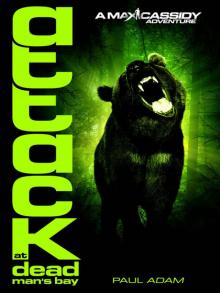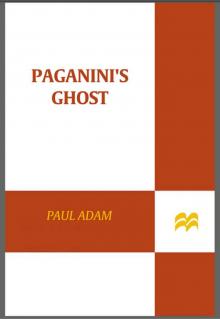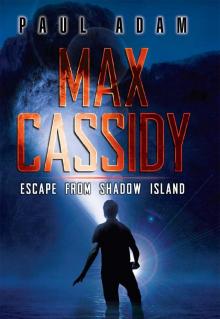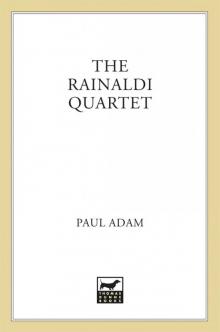Jaws of Death Read online
Page 13
‘I missed the train from St Albans and decided to hitch home,’ Max improvised. ‘It’s taking me longer than I thought.’
‘There are loads of lorries at South Mimms. One of them will give you a lift.’
The driver was right. When they reached the service station, Max wandered around the lorry park and quickly found a trucker who was willing to take him into London. Max told him the same story about missing his train, and the trucker, taking pity on him, went out of his way to drop him off just a couple of miles from home. Max walked that final bit of his journey, climbing over the garden wall to approach the house from the rear. He used his home-made lock-pick to open the basement door and stepped inside. As he fumbled in the darkness for the light switch, he suddenly felt an arm hook around his neck, squeezing his windpipe.
‘It’s me,’ he managed to croak feebly.
The arm pulled away and the light snapped on. Chris stared at him. ‘Jeez, Max, I’m sorry. Did I hurt you?’
‘I’m OK.’
‘I didn’t know who it was. I just heard someone fiddling with the lock. Thank God you’re back. Where’ve you been? We’ve been worried sick.’
Max gave him a brief explanation, then said, ‘I’ll tell you the rest later. Right now, we have to get a move on. Do you know if Consuela booked our tickets for Sweden?’
‘Yes, she did. For this afternoon. The two of you.’
‘You’re not coming?’ Max asked, suddenly alarmed.
‘Not on the same flight. I’m going via Copenhagen. It’s safer if we don’t travel together.’
‘Good. We’d better wake her, get our passports.’
‘What’s the hurry? The flights aren’t—’
‘We have to go now,’ Max interrupted urgently. ‘Get an earlier flight. I have to be out of the country within the next few hours.’
It was nearly five o’clock when they arrived at Heathrow. Despite the early hour, the terminal building was already starting to fill up with passengers. It was two hours until the cell lights at Mount Pleasant came on. Max hoped that was sufficient time for them to change their flights and get out of the country.
He and Consuela went to the British Airways ticket counter and Consuela worked her charm on the male clerk, asking him whether there was space on an earlier flight to Stockholm. The clerk checked his computer and found them two spare seats on the 6.45 a.m. departure.
Chris wasn’t with them. They’d already split up outside the terminal and he was killing time in a coffee shop before flying out later in the day, as originally arranged. He was travelling on the new passport he’d acquired from one of his contacts – in the name of Alan Montgomery, supposedly a thirty-three-year-old sales executive whose photograph, at first glance, looked nothing like Chris – until he put on the pair of clear-lensed, horn-rimmed spectacles he’d also acquired – and suddenly he was Alan Montgomery.
Don’t overdo your disguise, Chris said. Don’t even think about wigs or false beards, they’re too easy to spot. Stick with your basic shape and appearance and add a small change – spectacles, dyed hair – to make yourself look different. Airport security would check names first, in any case, not photographic likenesses. They’d be looking out for a Chris Moncrieffe, not an Alan Montgomery.
Max had butterflies in his stomach as they went through passport and security control, wondering if he was going to be stopped. Had his escape from Mount Pleasant been discovered? Had Penhall alerted the airports to look out for him? If he had, it certainly wasn’t obvious. The official checked his passport and boarding pass and let him through without a word.
The plane left dead on time. Max had put on his spare wristwatch at home and he checked the dial every few minutes after take-off. By seven o’clock they had passed over the Essex coast and were out over the sea, heading northeast towards Scandinavia.
FOURTEEN
Max had never been to Sweden before. In his imagination, it was a strange, wild northern region, covered with snow and ice and thick pine forests and populated by tall blond people who wore fur hats and got around on skis or reindeer-drawn sleighs. So he was surprised – and maybe a little disappointed – to find that Arlanda Airport, twenty-five miles north of Stockholm, was just like every other airport he’d visited. It could have been Heathrow, except it was smaller and cleaner and the signs were in Swedish as well as English. There were certainly plenty of tall blonds in the arrivals area, but none of them was wearing a fur hat, and as for snow and reindeer, well, there was no sign of either, unless you counted the stuffed toys in the airport shop.
On the flygbuss into the centre of Stockholm, Consuela told Max a bit about the city – how it was known as ‘the Venice of the North’ because it was built on a series of islands, connected by bridges. She’d done some sightseeing when she’d come with Max’s dad and thought it was one of the most beautiful cities she’d ever visited. She’d loved the fresh sea air, the architecture and old houses, and the fact that wherever you looked there was water, either at your feet or gleaming in the distance between the distinctive Scandinavian buildings.
Max saw it for himself when they got off the bus outside the central railway station and took a taxi to their hotel, driving along the edge of what Consuela described as the oldest part of the city – the Gamla Stan – with water on one side of the road and a row of ancient houses on the other, with occasional glimpses of a tall red-brick church tower and an elegant stone façade that Consuela said was the Royal Palace.
The taxi crossed a busy traffic intersection that formed a bridge to the island of Södermalm, then passed the Tunnelbana – Underground – station at Slussen and began to climb up a hill. Over the stone parapet at the side of the road, Max saw boats in the port, and green, wooded shores along the shipping channel that led out towards the sea.
The taxi turned left up another hill and stopped outside a five-storey brick building with a sign outside that read HOTEL KATARINA. Across the road was a small public park with rocky outcrops, patches of grass and a path leading to a stone church that was topped by a green copper spire. On the slope in front of the church nestled a ramshackle little wooden cottage that looked as if it belonged in a fairy tale.
Consuela paid the taxi driver with some of their Swedish kronor, then they picked up their luggage – they’d travelled light: just a small overnight bag each – and went into the hotel. The foyer was bright and modern: a varnished wooden floor, a reception desk made of pine, a seating area with steel-framed armchairs and a glass-topped coffee table covered with colourful magazines. The receptionist was a young man in his mid-twenties with spiky blond hair and a gold ring in one ear. He was wearing jeans and an open-necked casual shirt. He glanced briefly at Max, then gave Consuela a longer look and smiled.
‘Señorita Navarra, it’s good to see you again,’ he said in excellent English.
Consuela was surprised. ‘You remember me?’
‘Of course. How could I forget? How long ago was it that you were here? Two, three years? Welcome back to Stockholm.’
The receptionist smiled again, unable to take his eyes off Consuela. Max watched with amusement. Consuela had that effect on men. Max was used to feeling completely invisible when he was with her.
‘It was two single rooms, wasn’t it?’ the receptionist asked.
He clicked a mouse and studied the computer screen behind the counter. ‘I’ve put you in number eight, one of the rooms overlooking the garden at the back. It’s much quieter there. And the young gentleman … Mr Cassidy.’ The receptionist looked up. ‘I’m guessing, but you are Alexander Cassidy’s son, no?’
‘Yes,’ Max said.
‘I remember him too. I was sorry to hear about … about what happened. You are in room number four, just across the landing from Señorita Navarra.’
He handed Consuela a couple of key cards. ‘Breakfast is in the dining room between seven and nine. Do you have any luggage?’
Consuela held up her small bag. ‘Just this.’
; ‘Would you like a hand with it?’
‘Thank you, but I think I can manage.’
‘Your rooms are on the first floor.’
The young man went ahead of them and pressed the button to summon the lift. ‘Enjoy your stay. If there’s anything else I can do to help, please let me know,’ he said to Consuela.
‘Thank you, I will,’ she replied politely.
Max waited until the lift doors had closed behind them before he grinned at Consuela and said, ‘You should have let him carry your bag. It would have made his day.’
‘He was only being friendly.’
‘Then he could’ve polished your shoes with his tongue.’
‘Stop it, Max. He was a very nice young man.’
‘Very nice,’ Max agreed.
Consuela gave him a hard stare. ‘That’s enough.’
They went to their rooms. Max’s was small, but comfortable, the window overlooking the street that ran down the side of the hotel. He didn’t care what it was like. It was only for one night. He dumped his bag on the floor – there was no point in unpacking it – and went back downstairs. He borrowed a Stockholm telephone directory from the receptionist and went to Consuela’s room. It was twice as big as his, with a floor-to-ceiling window that provided a view over the garden – a lawn and a small patio with tubs of flowers and a few chairs on it.
Max looked up the number of Grön Värld, the environmental charity that had employed Erik Blomkvist, and punched it into the phone next to Consuela’s bed. A man answered, speaking Swedish. Max didn’t understand what he’d said.
‘I’m sorry, but do you speak English, please?’
‘Of course. What can I do for you?’ the man said in faultless English.
‘My name is Max Cassidy. I wanted to talk to someone about Erik Blomkvist.’
‘Erik? Erik is no longer with us, I’m afraid.’
‘I know. That’s what I want to talk about. His disappearance, the work he was doing before he went missing.’
There was a short silence. When the man came back on, his voice was guarded. ‘Did you say Cassidy?’
‘Yes, Max Cassidy.’
‘You are related to Alexander Cassidy?’
‘He’s my father.’
‘Give me your number. I’ll call you back in five minutes.’
‘But can’t I—’
‘Five minutes,’ the man said urgently. ‘What’s your number?’
Max thought about giving the name of their hotel, then changed his mind. The man’s tone had unnerved him. He gave his mobile number instead. The line went dead. Five minutes later, his mobile rang.
‘Max?’
‘Yes.’
‘I’m sorry about that. My name is Axel Svensson. I’m out of the office now, on a different phone.’
‘Your phones aren’t safe?’ Max said.
‘Let’s say we have our suspicions. Our work is sometimes controversial, sometimes political. There are people who don’t like what we do. Now tell me, why are you interested in Erik?’
‘I think I might know what happened to him. I’m in Stockholm. Can we meet? I could come to your offices.’
‘Not our offices.’ Svensson’s voice was wary. ‘I’m busy all day, but I can meet you this evening. Where are you staying?’
‘The Hotel Katarina, in Södermalm.’
‘There’s a restaurant not far from your hotel. The Sista Styvern, on Fjällgatan. I will meet you there for dinner at nine.’
‘OK.’
‘Until then.’
‘Just one more thing,’ Max said quickly. ‘You asked if I was related to Alexander Cassidy.’
‘Yes.’
‘Do you know my father?’
‘I’ll tell you tonight,’ Svensson said, and hung up.
Max and Consuela spent the afternoon in the hotel. Max went to bed for a few hours. He’d had no sleep the previous night and was dog-tired. When he awoke it was still only six o’clock. There was a lot of time to kill before they went to meet Axel Svensson.
Max wondered about going out and exploring the city, but they’d agreed that they would remain in their rooms, at least until Chris arrived. Stockholm was a peaceful, civilized place, but after their experience on the road near Henley and Max’s incarceration in Mount Pleasant, it made sense to be careful, particularly given Svensson’s manner on the phone – his reluctance to talk, his suspicions that their call might be being monitored. If Svensson was worried, then Max and Consuela needed to be extra-cautious.
Max was restless. There was nothing to do in a hotel room. He read a book he’d brought with him for a while, then switched on the television. Maybe there was a good film on that he could watch. He flipped through the channels, but found only game shows and soaps, all in Swedish. He watched one of the game shows for a while, trying to work out what was going on, then gave up and switched off the TV.
He wasn’t used to inactivity. At home, at about this time of the day, he would normally be training, working out on the exercise machines in the basement or practising his escapology techniques. He could do a few exercises now – some press-ups, some pull-ups on the doorframe of the en-suite bathroom – but he couldn’t be bothered. For once his self-discipline had deserted him. Instead he lay on the bed and thought about his escape from Mount Pleasant. Rupert Penhall would know by now that Max had flown to Stockholm. Would he contact the Swedish authorities, get them to arrest Max, maybe put him on a plane straight back to London? Max didn’t know. Sweden was a foreign country. Did Penhall have that kind of influence here? There was no point wondering. If it happened, it happened.
Max looked at his watch again. It was seven fifteen. He went into the bathroom and took a long shower to give himself something to do. He was fully dressed, drying his hair with a towel, when there was a knock on the door. Max went to the peephole and looked out. There was a man in the corridor; a tall man with horn-rimmed spectacles.
Max unlocked the door and swung it open. Chris came in, glancing around the room.
‘Everything OK?’ he asked.
‘Fine. How was your trip?’
‘No problems. You?’
‘Easy.’
‘No questions at the airport?’
‘No.’
‘Or tails at this end?’
‘I don’t think so.’
Chris went across to the window and stood to one side, peering down warily into the street. ‘I’m in room fourteen, on the floor above,’ he said. ‘Have you been in touch with Grön Värld?’
‘We’re meeting a guy named Axel Svensson for dinner at nine.’
Chris checked his watch. ‘Where?’
‘A restaurant. Consuela was going to look up the street on her map.’
‘Let’s go and find her.’
Max tossed his towel into the bathroom and they went across the landing to room eight. Max knocked. Consuela opened the door, then stood aside to let them enter. She’d tied her hair back and changed into black trousers and a plain white top.
Chris went through the same procedure again – crossing to the window and looking cautiously out into the garden.
‘Nice view,’ he said. ‘You seem to have ended up with the best room.’
‘The receptionist fancies her,’ Max said.
‘Yeah?’ Chris said.
Consuela coloured slightly. ‘Max, be quiet.’
She turned away and picked up a map of Stockholm from the desk. ‘I found Fjällgatan,’ she said. ‘It’s not far from here. A ten-minute walk, maybe.’
She spread out the map on the bed and pointed to an area on the southern edge of central Stockholm. ‘This is Södermalm,’ she said. ‘We’re here, near Skånegatan, and Fjällgatan is here, just half a kilometre or so away.’
Chris looked at his watch again. ‘I think we should leave now, get there early. That will give us time to check out the area, see who else is in the restaurant.’
Consuela folded up the map and put it in her handbag. They went downstairs
and across the foyer. The receptionist barely glanced at Max and Chris, but beamed warmly at Consuela and wished her a pleasant evening.
Outside on the street, Chris turned to Max and said, ‘You’re right, I’ve never seen a more lovesick guy in my life.’
‘Oh, shut up,’ Consuela said irritably and set off along the street.
Chris and Max had to run to catch up with her.
‘Hey, wait for us,’ Max cried.
Consuela stopped. ‘No more jokes, OK?’ she said. ‘They’re not funny.’
‘OK, we’re sorry.’ Max could see that she wasn’t in the mood for humour. Being in Stockholm was making her edgy.
‘Yeah,’ said Chris. ‘It’s not the poor guy’s fault that he has terrible taste in women.’
Consuela’s mouth tightened. She spun round and kept on walking.
‘OK,’ Chris called after her. ‘I’m sorry, no more jokes.’
Consuela slowed a little, appeased by the apology. Max and Chris drew alongside her. She consulted the map and they turned right down a hill, going past apartment blocks, and shops and offices that were closed up for the night. At the foot of the hill they skirted a children’s playground and climbed up a steep flight of stone steps onto a ridge occupied by a massive red-brick building that looked like a school or a hospital. Consuela led them past, then down a narrow flight of wooden steps onto a street that seemed to be suspended above the harbour on the very edge of a cliff.
‘This is Fjällgatan,’ she said.
They saw a sign reading SISTA STYVERN hanging from a bracket outside one of the buildings at the western end of the street, but they didn’t head for it immediately. They went in the opposite direction, walking towards the eastern end, where there were buildings only on the right-hand side. On the other side was a long, narrow strip of public gardens that gave a magnificent view out over Stockholm.
There were one or two people sitting on benches, enjoying the warm evening air. It was almost nine o’clock, but it was still very light, much lighter than it would have been in London. Max vaguely remembered from his geography lessons that the summer days got longer the further north you went.

 Attack at Dead Man's Bay
Attack at Dead Man's Bay Paganini's Ghost
Paganini's Ghost Escape from Shadow Island
Escape from Shadow Island The Rainaldi Quartet
The Rainaldi Quartet Jaws of Death
Jaws of Death